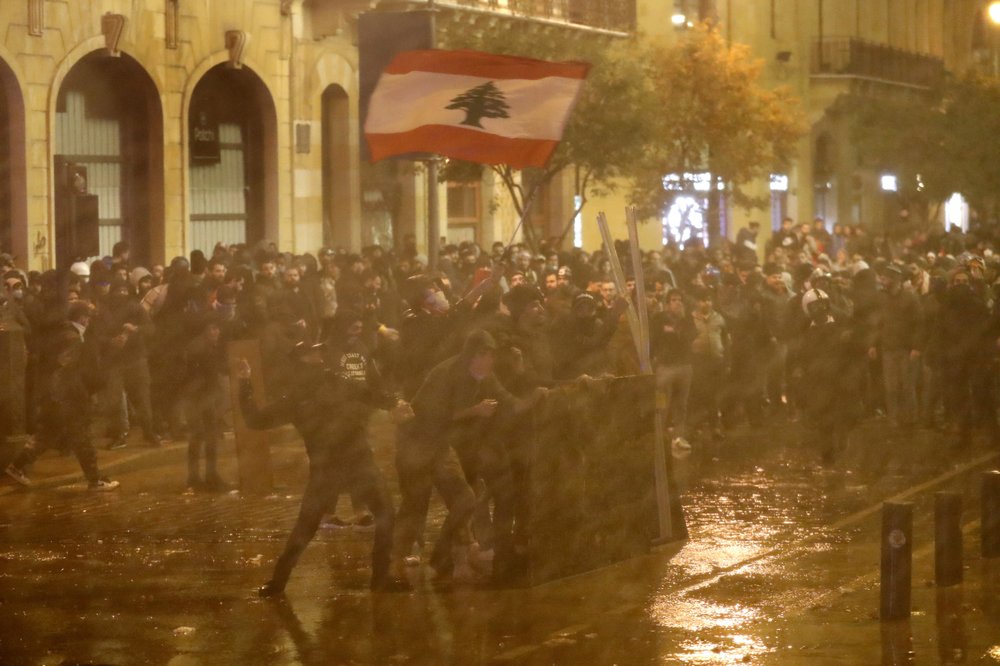
BEIRUT (Reuters) — Lebanon ushered in a new government that will need to walk a political tightrope, as President Michel Aoun said its main task was to win back international confidence that could unlock the funding the crisis-hit country badly needs.
Prime Minister Hassan Diab’s government met for the first time on Wednesday.
Formed by the Iranian-backed group Hezbollah and its allies without the participation of major Lebanese political parties that enjoy Western backing, it also faces one of the biggest financial crises in the heavily indebted country’s history.
A liquidity crunch that has hit the Lebanese pound, fueled inflation and driven banks to impose capital controls.
“Your mission is delicate,” Aoun’s office cited him as telling the cabinet. “It is necessary to work to tackle the economic situation, restore the confidence of the international community in Lebanese institutions and reassure the Lebanese about their future,” Aoun said.
Lebanon, burdened with a public debt equivalent to about 150% of GDP, won pledges exceeding $11 billion at an international conference in April 2018 conditional on reforms that it has so far failed to implement.
U.N. Secretary General Antonio Guterres welcomed the government formation and said he would work with Diab to support the reform agenda, Guterres’ spokesman said in a statement on Wednesday.
Diab, whose cabinet took final shape as long-running protests against the country’s political elite resumed on Tuesday night, will have his work cut out to reassure Sunni Gulf states that have joined the United States in designating Shi’ite Hezbollah a terrorist group.
The premier said on Tuesday his first trip abroad would be to the Arab region, particularly Gulf states that have in the past provided financial aid to Lebanon. Saudi Arabia and the United Arab Emirates, deeply concerned for years over Hezbollah’s rising influence in Beirut, have appeared to hesitate to extend financial support in this latest crisis.
Lebanon had been without effective government since Saad al-Hariri, the country’s main Sunni leader and a traditional ally of the West and Gulf states, quit as premier in October following widespread protests against politicians who have led Lebanon into its worst crisis since the 1975-90 war.
Lebanon sovereign dollar-bonds higher by as much as 1 cent on Wednesday with the formation of the new government after weeks of wrangling over portfolios.
New Finance Minister Ghazi Wazni said on Tuesday that Lebanon needed foreign aid to save it and described forthcoming foreign currency sovereign debt maturities, including a $1.2 billion Eurobond maturing in March, as “a fireball”.
At the cabinet meeting, Diab called for support for the army and the security forces, who have clashed with protesters over the past week, with hundreds injured.
Diab was nominated by Hezbollah and allies last month. Hariri and his Future Movement have stayed out of the government, along with the staunchly anti-Hezbollah Christian Lebanese Forces party and the Progressive Socialist Party of Druze leader Walid Jumblatt.
“The problem resides in the fact that the majority of them (new ministers) gravitate in the camp of the same political forces who have led the country to the current situation,” Samir Geagea, head of the Lebanese Forces, said in remarks published by L’Orient-Le Jour daily on Wednesday.
Reporting by Tom Perry and Ellen Francis in Beirut and Ghaida Ghantous; Additional reporting by Karin Strohecker in London; Editing by Tom Hogue and John Stonestreet
Image: Anti-government protesters are sprayed by a water cannon as they clash with the riot police, during a protest against the new government, near the parliament square, in Beirut, Lebanon, Wednesday, Jan. 22, 2020. A new Cabinet was announced in crisis-hit Lebanon late Tuesday, breaking a months-long impasse amid mass protests against the country’s ruling elite and a crippling financial crisis, but demonstrations and violence continued. (AP Photo/Hussein Malla)



